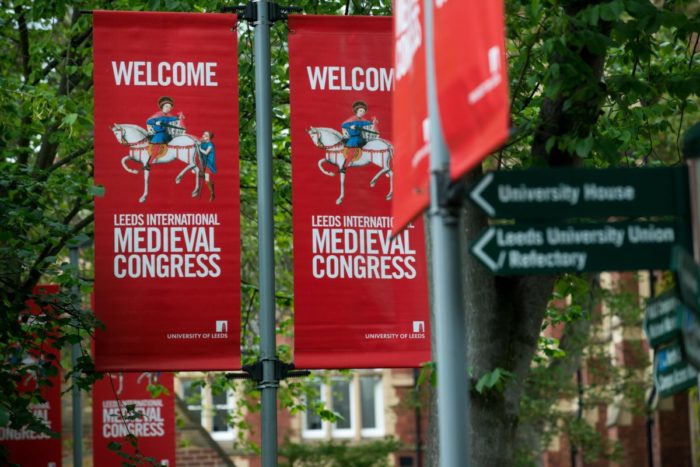IMC 2023

IMC 2023 took place from Monday 03 July to Thursday 06 July 2023 and it was our strong intention, coronavirus restrictions permitting, that there was both an in-person and virtual component.
Conference Programme
- Browse by timeslot
- Browse by sessions
- Browse by keywords
- Browse by strands
- Browse by sponsors
- Browse by participants
You can also download the archived PDF programme for IMC 2023 here, or download the IMC 2023 programme in large print here.
Call for Papers: IMC 2023 - Networks & Entanglements
The IMC provides an interdisciplinary forum for the discussion of all aspects of Medieval Studies. Proposals on any topic related to the Middle Ages are welcome, while every year the IMC also chooses a special thematic focus. In 2023 this is ‘Networks and Entanglements’.
‘Networks’ have become a much-employed term in the connected world of the 21st century, and also in scholarship. Historical studies, including medieval studies, have adapted concepts from sociology and digital tools to survey, visualise, and analyse the webs of interaction and relations among individuals, groups, places, artefacts, or polities. These notions emerge from a far-reaching relational approach across disciplines. Networks thus emerge from, or are defined as, multifaceted interdependencies. They highlight linkages between the human and non-human sphere, akin to how medieval people perceived manifold connections between the macro- and the microcosm. ‘Networks’ can address all kinds of relationships, connections, and correlations, their manifestations and structures, dynamics, and limits.
‘Entanglements’ is a term originally employed in studies of materiality to capture mutual dependencies between humans, artefacts, and sites in a fuzzier, but more flexible way. It has a key role in understanding complex connections, correlations, and relationships of diverse groups and cultures. Along similar lines, we invite medievalists of all fields to reflect upon linkages between individuals, groups, communities, and other bodies in various social and intellectual contexts, between humans, localities, and objects, between various species and ecologies, between motifs and iconographies, or between religious ideas, philosophical concepts, and narratives as networks of knowledge production. Especially welcome are attempts to entangle these various spheres, linking disciplines and methods, be they qualitative or quantitative, digital, or non-digital, or coming from archaeology, art history, linguistics, philology, history, or environmental, intellectual, literary, and religious studies.
Themes to be addressed may include, but are not limited to:
- Social, economic, or political networks within and between medieval societies
- Intellectual communities and networks of knowledge
- Religious networks and formations
- Spatial networks, architectures, and infrastructures
- Ecologies of connected, related, and entangled species
- Entanglements through artefacts and communities of practice and consumption
- Artistic networks and entangled iconographies and soundscapes
- Medieval and modern concepts of connectivity and interdependency
- Medieval and modern visualisations of entanglements and networks
- Medieval practices of networking
- Transnational, transregional, and trans-border networks
- Entanglements between the global and the local
- Narrative networks, literary and imagined entanglements
- Networks, mobilities, circulations, and flows, both real and fictitious
- Gendered networks: interconnections, relationships, and entanglements
- Network constraints, rules, and social roles
- Inclusion and exclusion through networks
- Identities, ego-networks, and emotional communities
- Network theory and complexity in medieval studies
- Digital humanities, linked data, and data ontologies
- Networks and networking in medieval scholarship past and present
- Ranges, limits, stability, and fragility of networks
The IMC welcomes session and paper proposals submitted in all major languages.
The Special Thematic Strand ‘Networks and Entanglements’ will be co-ordinated by Johannes Preiser-Kapeller (Institut für Mittelalterforschung, Österreichische Akademie der Wissenschaften, Wien).
